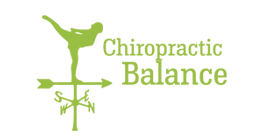Neck, Upper Limb And Standing Stretches in Porirua NZ
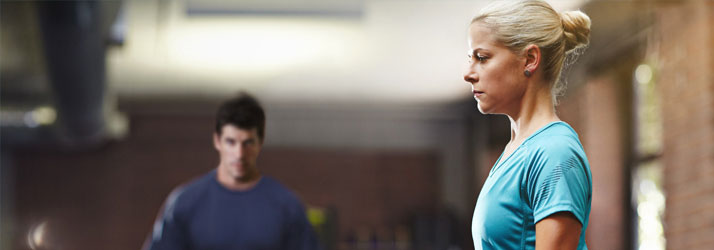
Posture Month 2021 - Week One
Each week the Chiropractors in Porirua NZ will be posting short videos on how you can improve your overall posture through simple stretches. These are the stretches that Dr Matt has covered this week from the videos.
When the neck and upper back muscles become weakened, the head sags forward and increased stress is placed on the cervical spine, which can lead to neck pain.
Strengthening these muscles can help improve posture and get the head closer to neutral position (with the ears directly over the shoulders). Like with any other part of your body, exercises and stretches can make the muscles in your neck stronger and more limber.
If you already have pain in your neck or elsewhere, talk to your Chiropractor before you start.
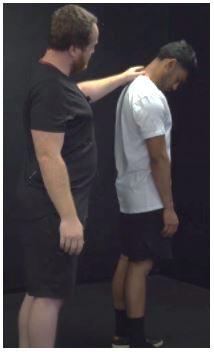
You will feel some tension in your neck muscles when you stretch. But you shouldn’t have pain. If you do, stop right away. If your pain persists — or worsens, you should consult your Chiropractor or other healthcare provider. Your symptoms could be tied to an underlying condition that requires professional treatment.
Neck Stretches in Porirua NZ:
Side Tilt
Do this while standing, with your feet hip-width apart and arms down by your sides.
- Gently tilt your head toward your right shoulder and try to touch it with your ear. Stop when you feel the stretch. Don’t raise your shoulder.
- Hold the stretch for 5-10 seconds, then return to the start position.
- Repeat on your left side. You can do several sets and work your way up to 10 repetitions.
- For extra stretch, put the hand on the same side of your tilted head on top of your head, and press lightly with your fingertips.
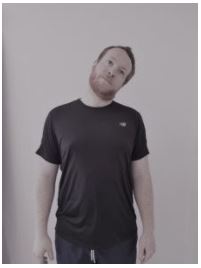
Side Rotation
You can do this while seated or standing.
- Keep your head squarely over your shoulders and your back straight.
- Slowly turn your head to the right until you feel a stretch in the side of your neck and shoulder.
- Hold the stretch for 15-30 seconds, and then slowly turn your head forward again.
- Repeat on your left side. Do up to 10 sets.
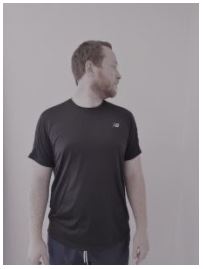
Seated Clasping Neck Stretch
Maintaining correct posture is important for this stretch.
- Clasp your hands and bring both palms to the back of your head.
- Sitting with a tall spine, ground your hips firmly into your seat.
- From here, begin to gently press your hands down toward your thighs, tucking your chin into your chest.
- As you press down, use the heels of your palms to pull your head away from your shoulders. This will intensify the stretch even more.
- Hold here for at least 5 seconds, and then slowly lift your head up and release your hands.
- Take your neck backward (without pain).
- Hold her for 5 seconds.
- This is one rep, repeat 3 times.
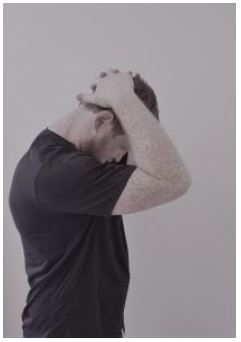
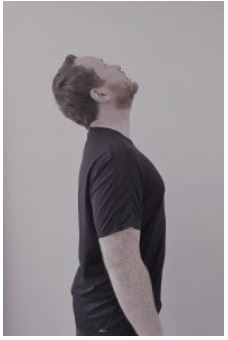
Upper Limb:
Corner Pec Stretch
A corner pec stretch is much like a push-up at the wall, except that the emphasis is placed on staying in the position that causes your chest muscles to lengthen:
- Place your forearms and palms on either side of the wall at approximately shoulder level.
- Inhale.
- Exhale, and pulling your lower abdominal muscles into your spine, lean toward the wall. You only need to go to the point where it feels challenging but causes no pain or discomfort. It’s more important to move your whole body as a unit, and not bend anywhere along the chain.
- Hold the position for between 5-30 seconds, then come back to start.
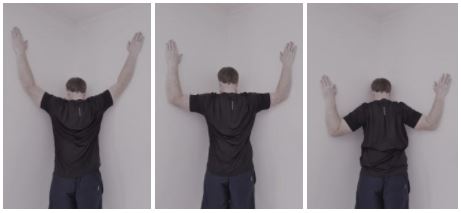
Shoulder Stretch
This is a great stretch if you have a shoulder injury and can only do one side.
- Find a doorway or something similar.
- Place your arm at a 90 degree angle on the doorway similar to the photo.
- Make sure you are forward facing, then slightly pivot to the opposite side your arm is up.
- Press forward until you feel a stretch in your chest.
- Hold for between 20-30 secs and repeat.
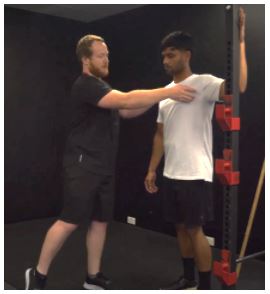
Biceps
Wrist Flexor Stretch
- Use the opposite hand to pull back fingers and wrist whilst straightening your elbow and taking your arm to 90 degrees in front of the body.
- Hold for 20- 30 secs and repeat on other side
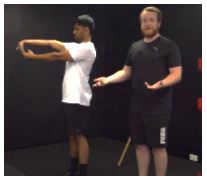
Bicep stretch
You will need either a pole or a broom
- Have the pole resting against a wall
- Come parallel to the pole and then reach back to grab the pole
- Step forward and bring the pole out (from against the wall)
- You will feel a stretch through your biceps.
- Do it for 20-30secs and repeat on other side.
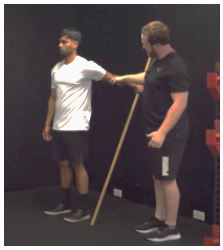
Triceps
- Raise arm above head so elbow points upwards.
- Use the opposite hand, pull the elbow behind the neck, while keeping the trunk and neck facing forwards and upright.
- Hold for 5 - 25 seconds. Repeat 3 times.
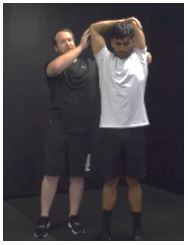
Cross-Body Shoulder Stretch
- Start standing or sitting tall. Grab one arm above your elbow with your opposite hand, and pull it across your body toward your chest until you feel a stretch in your shoulder.
- Make sure to keep your elbow below shoulder height.
- Hold for at least 30 seconds and then repeat on the other side.
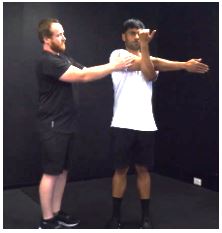
Standing posture
As more people become aware of the dangers of sitting for extended periods of time we are seeing standing posture becoming more relevant within our practice. The key to good posture is the position of your spine. Your spine has three natural curves - at your neck, mid back, and low back. Correct posture should maintain these curves. Standing for extended periods can put stress through your spine if done with poor posture.
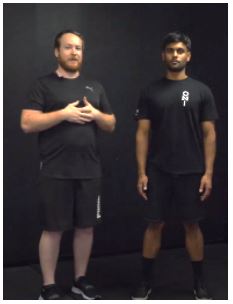
To help correct your standing posture, imagine a string attached to the top of your head pulling you upwards. The idea is to keep your body in perfect alignment, maintaining the spine's natural curvature, with your neck straight and shoulders parallel with the hips:
When standing:
- Bear your weight primarily on the balls of your feet.
- Keep your knees slightly bent.
- Keep your feet about shoulder-width apart.
- Let your arms hang naturally down the sides of the body.
- Stand straight and tall with your shoulders pulled down and backward.
- Tuck your stomach in.
- Keep your head level. Your earlobes should be in line with your shoulders. Do not push your head forward, backward, or to the side.
- Shift your weight from your toes to your heels, or one foot to the other, if you must stand for a long time.
How can I improve my posture when standing?
- Stand up straight and tall
- Keep your shoulders back
- Pull your stomach in
- Put your weight mostly on the balls of your feet
- Keep your head level
- Let your arms hang down naturally at your sides
- Keep your feet about shoulder-width apart
With practice, you can improve your posture; you will look and feel better.
Referencing:
Hasegawa K, Okamoto M, Hatsushikano S, Watanabe K, Ohashi M, Vital JM, Dubousset J. Compensation for standing posture by whole-body sagittal alignment in relation to health-related quality of life. Bone Joint J. 2020 Oct;102-B(10):1359-1367. doi: 10.1302/0301-620X.102B10.BJJ-2019-1581.R2. PMID: 32993332.
Yi J, Wang F, Yue R, Lin Q, Ding R, Xie X, Jiang H, Jian F, Li Y, Zhong Q. Effect of sitting and lying Liuzijue for lung rehabilitation in acute exacerbation of chronic obstructive pulmonary disease patients with non-invasive ventilation: Study protocol for a randomized controlled trial. Medicine (Baltimore). 2020 Sep 18;99(38):e22111. doi: 10.1097/MD.042338705022111. PMID: 32957331; PMCID: PMC7505391.
Bollinger LM, Ransom AL. The Association of Obesity With Quadriceps Activation During Sit-to-Stand. Phys Ther. 2020 Dec 7;100(12):2134-2143. doi: 10.1093/ptj/pzaa170. PMID: 32936920.
Shrestha N, Kukkonen-Harjula KT, Verbeek JH, Ijaz S, Hermans V, Pedisic Z. Workplace interventions for reducing sitting at work. Cochrane Database Syst Rev. 2018 Jun 20;6(6):CD010912. doi: 10.1002/14651858.CD010912.pub4. Update in: Cochrane Database Syst Rev. 2018 Dec 17;12:CD010912. PMID: 29926475; PMCID: PMC6513236.
OFFICE HOURS
Monday
9:30am - 1:30pm
Tuesday
7:00am - 6:00pm
Wednesday
9:00am - 6:30pm
Thursday
7:00am - 6:00pm
Friday
7:00am - 2:00pm
Saturday
8:00am - 2:00pm
Sunday
Closed
Chiropractic Balance
10/99 Mana Esplanade, Paremata,
Porirua, NZ 5026

